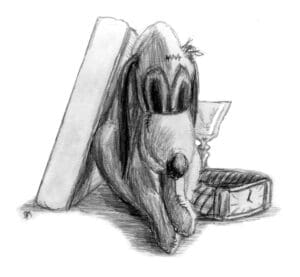Lessons from an old stuffed animal
By LORRAINE V. MURRAY, Commentary | Published June 9, 2023
My favorite stuffed animal as a little girl was a golden-furred Pluto dog, which I named Poppa. My love for him was so fervent that he became a pawn in the frequent skirmishes between my sister and me. Just the threat that she would string him up from the light fixture was enough to crush me.
 Over the years, the dog bore many scars, some from love and some from war. My mother had to sew his neck back onto his body with black embroidery thread and give him a new set of eyes when the originals were worn away. By the time I was a teenager, he didn’t have one shred of his original fur, but he was still my favorite.
Over the years, the dog bore many scars, some from love and some from war. My mother had to sew his neck back onto his body with black embroidery thread and give him a new set of eyes when the originals were worn away. By the time I was a teenager, he didn’t have one shred of his original fur, but he was still my favorite.
In school, Sister told us we would have resurrected bodies someday, which would be different from our earthly ones. She didn’t provide details, so I imagined my glorified body would be like Poppa’s, showing the scars I bore from the many times I fell on the sidewalk while roller skating.
I’m still intrigued by the notion of a resurrected body, although Scripture doesn’t provide details about how it will look. We know Mary Magdalene didn’t recognize Jesus after the Resurrection until she heard his voice. We know Jesus’ body bore the wounds from the cross, because Thomas touched them.
Perhaps our resurrected bodies will also bear the wounds we suffered in life, not just the physical ones, but the deeper hurts that brought us to Jesus. Often, it isn’t until we are emotionally wounded that we turn to God.
In “The Wounded Healer,” Henri Nouwen emphasizes that priests and lay ministers cannot hold themselves apart from the suffering crowd. To help someone in pain, we must reveal our vulnerability to others. We must become an image of the wounded Christ.
I can attest to the power of homilies that reveal the priest’s compassion for people in the congregation bearing Christ’s cross. Some folks may be close to despair and even considering suicide—and a priest acknowledging awareness of their struggles can make a huge difference.
People may be wounded by alcoholism, divorce, depression. They may be suffering the emotional repercussions of losing a child. They may be facing a terrifying diagnosis. They may be scarred by loneliness.
In “The Priestly Heart,” Father Maurice Sheehy creates an unforgettable character, a young priest dying from a heart condition who is still intent on helping others. In the hospital, this wounded healer ministers to a nurse, who long ago rejected God. When she confesses her sins and he gives her absolution, he says he’s never felt greater joy as a priest.
A neighbor’s husband, 55, succumbed to cancer, just months after he was diagnosed. When I visited her, she was deep in shock, as she tried to face this heart-breaking loss. I’ve assured her the tears are normal and told her she can lean on me. I’ve also given her books on grief that helped me.
One day, she texted me: “How did you get to the other side of losing Jef?”
I got there through a torrent of prayers, through advice from a priest and counselor and from the tender compassion of wounded widows.
Robert Frost wrote, “I can see no way out but through.” There comes a moment when we realize we must walk directly into the fire and pray we reach the other side. One thing is for certain, though—once we get there, we’ll never be the same.
A wounded healer’s mission is helping others put their lives back together, while realizing it’s God’s grace that ultimately heals. The mission includes assuring the suffering person: “I know what you’re going through, because I’ve been there. I walked through the fire and survived.”
I still have my old Poppa Pluto dog. The sewed-on neck, the embroidered eyes, the crooked paws are reminders of how much I loved him. He was the one I turned to in the middle of the night when my tears were flowing. He was the one who always listened patiently. He was my first wounded healer and he will always be with me.
Lorraine has written eight books, including a trilogy of church mysteries, starting with “Death in the Choir.” Artwork is by her late husband, Jef. Her email address is lorrainevmurray@yahoo.com.